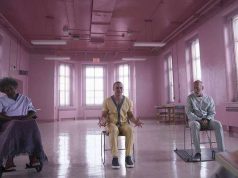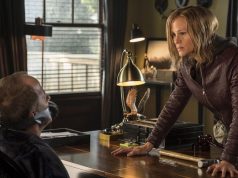“Walking Tall” is said to be “inspired by a true story,” but that’s a stretch. In reality, it was inspired by the 1973 film of the same name, and THAT movie was inspired by a true story. What actually happened to Sheriff Buford Pusser bears only passing resemblance to what occurs in this shallow, violent remake.
The original film, which I have not seen, starred Joe Don Baker as the Tennessee lawman. A user-submitted plot summary at the Internet Movie Database says Pusser “(fights) corruption in his county with a four-foot-long wooden club. When the criminals attack his family, Buford shoots a whorehouse manager in the head and runs hillbilly gangsters over with his car.” From this description alone, and in particular its reference to “hillbilly gangsters,” I can tell you I like the original better than the remake.
But first things first. The remake stars The Rock (aka Dwayne Johnson) instead of Joe Don Baker, calls him Chris Vaughn instead of Buford Pusser, and sets it in a rural Washington county instead of Tennessee (though most of the events make you think, “Shouldn’t this be happening in the South?”). Maybe they thought audiences wouldn’t believe a non-white man being named “Buford,” and maybe they thought we wouldn’t buy a person of color being elected sheriff in a tiny Southern town.
Whatever the reasons, we’re in the Northwest now, and Chris Vaughn has just returned home after eight years in the army. He is disturbed to see his once-tranquil town having turned a bit seedy. In his absence, the lumber mill was closed by its owner, silver-spoon Jay Hamilton (Neal McDonough), who subsequently opened a casino instead. The police, led by wussy Sheriff Watkins (Michael Bowen), look the other way whenever there’s crime involving the casino, because with the mill closed, it’s the town’s major source of revenue. Some of the locals are doing drugs, too, including Chris’ little brother Pete (Khleo Thomas). As Chris’ best friend Ray (Johnny Knoxville) puts it, “This ain’t home anymore.”
Chris, who is both hot-headed and self-righteous, is enraged to discover the casino using loaded dice at the craps table. He makes a fuss, which results in a major skirmish with casino security, which results in some of Hamilton’s top henchmen doing a number on Chris with a box cutter. The cops buy the casino’s version of the story, the one that says Chris kinda started the fight. Revenge plans foment.
Then Pete almost OD’s on crystal meth he got from the casino security guys, and Chris goes ballistic. He concludes Hamilton must be selling drugs out of his casino — an odd business plan considering, as Hamilton himself points out, the casino is plenty profitable on its own without adding drug trafficking to the menu. Chris grabs a block of wood and smashes up the casino, breaks some security guards’ arms, and beats a few others to within an inch of their lives.
That’s where the movie starts losing me: Chris is thoroughly unjustified in his actions. Even if he KNEW Hamilton was behind the drug thing, which he doesn’t, the movie has still taken a shortcut in having him seek this kind of revenge so early. Are we really to believe the local cops wouldn’t do anything about DRUG TRAFFICKING in a small-town casino? DRUG TRAFFICKING, people! It’s not loaded dice or too-nude pole dancers. Chris doesn’t even try legal routes, though. He had one bad experience with the sheriff — back when he tore the casino apart the first time, also only semi-justified — and decided they were useless. Sorry, but I’m not buyin’ it.
I’m buyin’ it even less when Chris is charged with all the crimes he committed there in the casino (vandalism, assault, etc.), fires his lawyer mid-trial, and represents himself — which he does by offering a rousing speech to the jury about how he had to fight for his hometown, at which point the jury finds him not guilty — EVEN THOUGH HE IS CLEARLY GUILTY — and then he gets elected as the new sheriff. It’s one of the most outrageously unbelievable series of events I’ve ever seen in a movie.
This is a classic example of a film assuming we will be on the side of its protagonist just BECAUSE he’s the protagonist. In fact, Chris behaves like a big, dumb animal, taking the law into his own hands at the slightest provocation, abusing his power egregiously once he becomes sheriff. (He still has to take down Hamilton once and for all, you see.)
Part of the problem is that we’re never given much indication that the town is as bad off as Chris seems to think it is. We see one or two people doing drugs, we see that Chris’ ex-girlfriend Deni (Ashley Scott) has become a stripper, and we see the lumber mill has shut down. That’s it. The film’s only 77 minutes long; I wonder if additional scenes were cut that would have better established the town’s downward spiral and Chris’ frustration over it.
Since this is a guy movie, the men generally get even with each other by vandalizing one another’s automobiles. (What better way to emasculate someone than to wreck the thing he bought as proof of what a man he is?) Being a guy movie also means that the casino strippers are shown amply, and that there is plenty of gunfire in the finale.
I’m able to enjoy certain moments and images in the film on a visceral level. Johnny Knoxville has the right kick-back attitude for his role, a gunfight held in the Vaughn family living room is funny, and obviously it’s entertaining to see stuff getting blown up or torn apart, like when Letterman drops watermelons off the roofs of tall buildings. But I can’t enjoy the movie as a whole. It’s too illogical and superficial, and it’s impossible for me to get behind the actions of its central character.
D+ (1 hr., 17 min.; )





